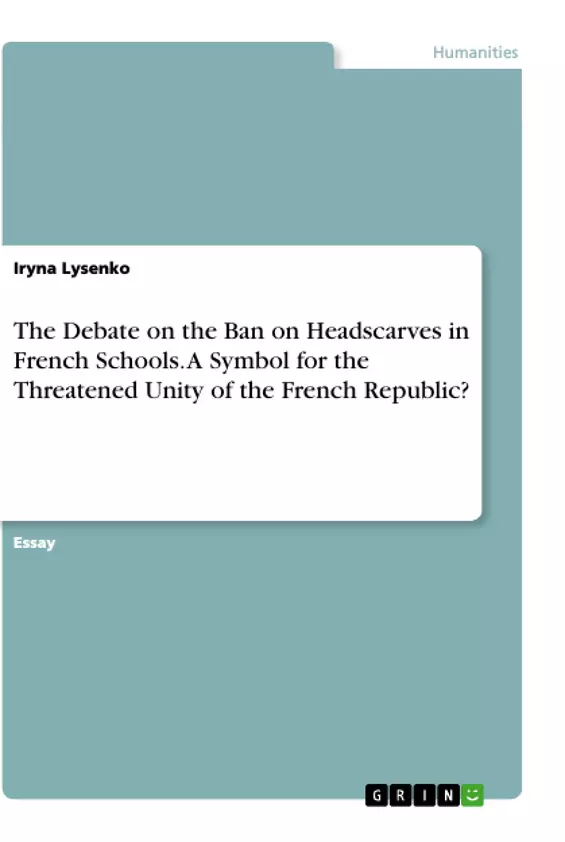The basic assumption of this work is that the theme of the headscarf and the strands of association linked to this symbol, such as fundamentalist Islam, cultural archaism and female oppression, are instrumentalized for a number of socially relevant secondary discourses, such as the question of the identity of the French Republic in a society that is becoming increasingly pluralistic both religiously and culturally, and the handling of a steadily growing Islamic community in France.
The work is also intended to draw attention to the topic and, for example, to deal in more detail with the gender debate that is developing in subsequent work. This analysis is based on two commentaries, each of which irradiates the headscarf debate differently. Talal Asad comments on the behaviour of the state, because it cannot take the right out of it to determine what religious signs or individual orientation is. Subsequently it will be discussed to what extent it seems impossible in our modern society to drop habitualized religious symbols. Finally, a comparison of these two approaches and a personal statement on this topic will follow.
One of the motifs of the investigation is the question of whether and in what way the headscarf, "alienated" from the girls in the course of the debates, served various public discourses as a legitimate means of distracting attention from the experiences of racism and exclusion of the second and third generations, of working off problems within society, and of strengthening a common, French sense of identity.
Inhaltsverzeichnis (Table of Contents)
- Introduction
- Talal Asad's view of the French secularism
- Jansen Yolande's view of the French secularism
- Comparison of both approaches
- Conclusion
- Resources
Zielsetzung und Themenschwerpunkte (Objectives and Key Themes)
This work aims to untangle the complex debate surrounding the ban on headscarves in French schools, exploring the individual themes and arguments that fueled the controversy. The author argues that the issue of headscarves was instrumentalized for broader social discussions, particularly concerning the identity of the French Republic in a multicultural society and the integration of a growing Muslim community.
- The role of the French state in regulating religious expression and its impact on the concept of secularism.
- The relationship between the headscarf as a symbol and broader social and cultural debates, including issues of identity, integration, and oppression.
- The potential for the headscarf debate to distract from deeper issues of racism and exclusion faced by Muslim communities in France.
- The implications of the ban on headscarves for freedom of expression and religious freedom.
- The complexity of interpreting religious symbols and the need for understanding and sensitivity in navigating multicultural societies.
Zusammenfassung der Kapitel (Chapter Summaries)
The introductory chapter sets the stage by outlining the historical context of the headscarf debate in France, highlighting its significance and the various arguments that have shaped public discourse.
Chapter 2 delves into Talal Asad's perspective on the French state's approach to secularism. Asad argues that the state's attempt to regulate religious symbols through the headscarf ban exemplifies a flawed understanding of religious practice and demonstrates a lack of neutrality towards different faiths. He emphasizes the need for greater understanding and sensitivity towards diverse religious expressions within a multicultural society.
Schlüsselwörter (Keywords)
The primary focus of this work is the debate surrounding the ban on headscarves in French schools. Key themes include: secularism, laïcité, multiculturalism, integration, religious freedom, freedom of expression, Islam, Muslim community, identity, oppression, racism, exclusion, and the French Republic.
Frequently Asked Questions
Why is the headscarf ban a major debate in France?
The ban is linked to the core French value of "laïcité" (secularism) and is seen by some as a protection of republican identity, while others view it as a threat to religious freedom.
What is Talal Asad's view on the French headscarf ban?
Asad argues that the state oversteps its bounds by trying to define what constitutes a religious sign and that the ban lacks neutrality towards different faiths in a multicultural society.
Does the headscarf debate distract from other social issues?
The author suggests that the intense focus on the headscarf may serve as a distraction from deeper issues like racism, exclusion, and social problems faced by the second and third generations of immigrants.
How is the headscarf instrumentalized in public discourse?
It is often used as a symbol for fundamentalism, cultural archaism, or female oppression to strengthen a common French identity against perceived external influences.
What are the implications of the ban for religious freedom?
Critics argue that the ban limits individual orientation and the right to express one's religious identity in public spaces like schools, which are supposed to be inclusive.
- Quote paper
- Iryna Lysenko (Author), 2019, The Debate on the Ban on Headscarves in French Schools. A Symbol for the Threatened Unity of the French Republic?, Munich, GRIN Verlag, https://www.grin.com/document/501264



